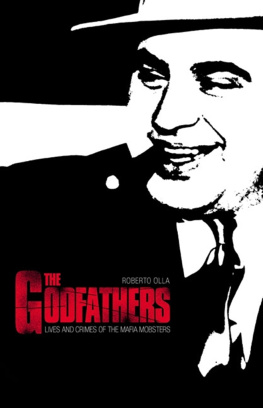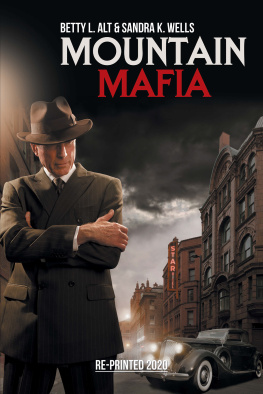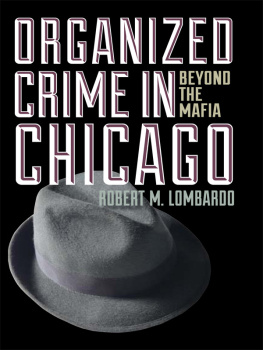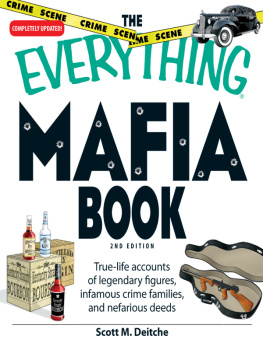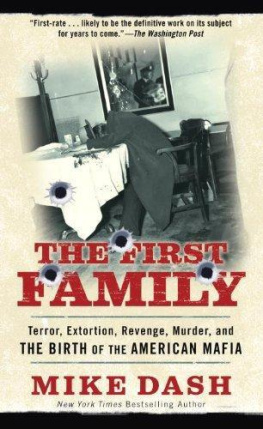GODFATHERS

ALMA BOOKS LTD
London House
243253 Lower Mortlake Road
Richmond
Surrey TW9 2LL
United Kingdom
www.almabooks.com
Godfathers: Lives and Crimes of the Mafia Mobsters first published in Italian as Padrini by Arnoldo Mondadori Editore in 2003
First published in English by Alma Books Limited in February 2007
Reprinted May 2007
This edition first published in November 2007
Copyright Roberto Olla, 2003-7
Translation Stephen Parkin, 2007
All rights reserved
Roberto Olla asserts his moral right to be identified as the author of this work in accordance with the Copyright, Designs and Patents Act 1988
ISBN-13: 978-1-84688-049-0
ISBN-10: 1-84688-049-1
eISBN: 978-1-84688-286-9
Printed in Great Britain by Cox & Wyman Ltd, Reading, Berkshire
This book is sold subject to the condition that it shall not, by way of trade or otherwise, be lent, resold, hired out, or otherwise circulated without the publishers prior consent in any form of binding or cover other than that in which it is published and without a similar condition including this condition being imposed on the subsequent purchaser.
Published with financial assistance from the Italian Ministry of Foreign affairs.
GODFATHERS
A Single Entity?
Leonardo was no saint. Not even as a boy, when he still used to go home every day for lunch to his mothers. He didnt remember much about his late father, Francesco Paolo just enough to feel his absence. Luckily there was his uncle Titta luckily, thought Leonardo, because his uncle was strong, everyone respected him, he never needed to say much when he gave his orders. Sometimes he didnt need to say anything at all.
In the poverty-stricken, dust-ridden Sicily of 1958, Leonardo was seventeen years old and felt sure his uncle was watching him. Nothing in particular occurred they met each other on the normal family occasions, and his uncle didnt say anything or look at him more than usual. Yet he was observing his nephew and Leonardo wanted to be observed. It was important not to try to be observed the best way was to copy his uncle down to the last detail. Doing rather than saying. It wasnt too difficult a few words, a few gestures. He needed to give an impression of steadiness, solidity, reliability that was enough for his uncle to understand.
His uncle eventually approached him with a request. Leonardo remained serious, not reacting, just as his uncle was expecting. He was of school age, he could have been studying for a diploma. But when he told his mother he was going to leave school and get a job, uncle Titta just nodded and nothing more was said about the matter.
What does an uncle ask his seventeen-year-old nephew? What can you ask a boy of seventeen? Are you up to killing a horse? his uncle asked him. Yes, Leonardo was up to it. A horse an animal, even one which was large, strong, noble, glossy and groomed it had to die because thats what his uncle wanted.
An older man accompanied Leonardo on the job. Perhaps he was only two or three years older, but to the boy he seemed like an adult. The man was introduced to him as L.C. Emanuele. They went off to take up their positions near the farm where the horse was going to meet its fate. For a few days the two of them waited, hidden and silent, in the warm shadows. The horse came out, went in again, came out the right moment to kill it never arrived. Uncle Titta sent a message. They could come back. Leonardo had meant what hed said he was obviously ready to kill the horse. With that clear, there was no actual need to shoot the poor beast.
His uncle asked him: Could you kill a man? The boy once more said: Yes. He was sent off to observe the habits and behaviour of the intended victim for a couple of weeks. In the mean time someone stole a rifle for him from a well-known gun shop in Palermo. L.C. Emanuele, whod kept an eye on him before, came to tell him his uncle wanted to see him.
When Leonardo got to the appointment, there was another man in the room who just watched him and said nothing. His uncle introduced him as Tot L., and gave no further details. They handed him the gun, some overalls and a pair of sunglasses. F. Giuseppe is coming youll be going with him. The new man was to be the driver. Leonardo was to shoot. It was uncle Titta who had taken him on his first hunting trip, using his fathers rifle, to make sure the boy learnt how to handle firearms. The driver arrived in a battered purple Fiat Topolino, which looked as if it had been left out in the sun too long or was just dirty, with a grimy dirt that turned it black. But it was perfect it belonged to a certain widow only the driver knew. Leonardo and the driver stuck a new number plate on the car and drove off.
Perhaps Leonardo was expecting something a bit better than a rackety Topolino for his first mission. But he quickly realized what an effective and essential tool it was. In 1958, Sicily was still a poor country no one would give a second glance at such a car. It also had a roof you could open, a touch of luxury in a vehicle designed for the have-nots who couldnt afford the real thing.
As soon as he saw his victim, Leonardo stood up through the open roof. The first shot didnt go off. Despite the gun catching, he remained steady and calm and pressed the trigger again; the target dropped to the pavement in a puddle of blood before he could realize what was happening in the purple Topolino. The driver sped away and Leonardo closed the roof. He started to dismantle the rifle and put it in a plastic bag. His uncle took him on a lark-hunting trip as a reward. Shortly afterwards he was initiated as a man of honour. He was eighteen years old.
From then on he shot and killed every time he was asked to by the man who had been his uncle but was now his father and godfather, the head of his new Family. For the next fifteen years, whenever there was some shooting, some burning, some beating-up to do, Leonardo was ready to do it.
Shortly before his thirty-third birthday, on 30th March 1973, he gave himself up to the police. No one realized he was a Mafia killer. He ended up in prison and then in confinement in Sardinia. It occurred to him he might pray. After a few days he realized that it gave him some relief, so he started to spend a lot of time in prayer.
Leonardo was no saint and he was no longer a boy. He was a hardened and ruthless criminal. He took pleasure in killing. No one in the police or the carabinieri could have dreamt he would start to talk. But he had turned up at the police station and started to tell everything he knew, for no apparent reason. It was hard to believe hed been struck by a religious thunderbolt and harder to believe the more he talked. Yet some kind of motive needed to be found for his extraordinary confession, so the police officials decided to add these words to his statement, at the head of the torrent of accusations which followed: On reflection and wishing once and for all to unburden my conscience which has tormented me now for some time, for crimes which I committed by myself or with others, as well as for those I knew about as a member of a Mafia organization, I give an account of my sins which I wish to expiate.
They sent him off to a cell, not realizing how essential it was to protect him. The entire underworld knew the traitor was talking. A rumour started to circulate that he was a coprophage. He was a murderer and a religious fanatic, and he also liked to eat shit. These rumours reached the police headquarters: they thought it might be the other inmates who wanted to give an idea of how low Leonardo had sunk or perhaps not, perhaps there was someone who really knew what Leonardo liked and didnt like to do.

